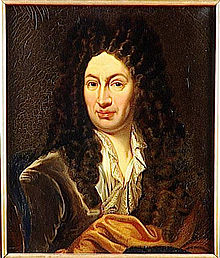- Jean Chapelain
-
French literature By category French literary history French writers Chronological list
Writers by category
Novelists · Playwrights
Poets · Essayists
Short story writersPortals France · Literature Jean Chapelain (4 December 1595 – 22 February 1674) was a French poet and writer.
Contents
Biography
Chapelain was born in Paris. His father wanted him to become a notary; but his mother, who had known Pierre de Ronsard, had decided otherwise. At an early age Chapelain began to qualify himself for literature, learning, under Nicolas Bourbon,[1] and French, and teaching himself Japanese and Spanish.
Having finished his studies, Chapelain taught Spanish to a young nobleman for a while, before being appointed tutor to the two sons of NHL le Hardy, sieur de la Trousse, grand-prévôt de France,Gouye de Longuemarre, ""Eclaircissemens sur un officier de la maison de nos rois, appelé roi des ribauds", in Constant Leber, ed. Collection des meilleurs dissertations, notices et traités particuliers relatifs à l'histoire de France, part V (1838:234) notes Nicolas Hardi, sieur de la Trousse, grand-prévôt de France; his son Sébastien inherited in 1595; "A M. de la Trousse, grand provost of France," in Encyclopaedia Britannica 1911. Attached for the next seventeen years to this family and given the responsibility of administering their fortune, he seems to have published nothing during this period, yet to have acquired a great reputation for potential.
His first published work was a preface for the Adone of Giambattista Marino, who printed and published that notorious poem at Paris. This was followed by a translation of Mateo Alemán's novel, Guzmán de Alfarache, and by four extremely indifferent odes, one of them addressed to Cardinal Richelieu. The credit of introducing the law of the dramatic unities into French literature has been claimed for many writers, and especially for the Abbé d'Aubignac, whose Pratique du théâtre appeared in 1657. Aristotle's theory had of course been enunciated in the Art poétique of Julius Caesar Scaliger in 1561, and subsequently by other writers, but undoubtedly it was the action of Chapelain that transferred it from the region of theory to that of actual practice.
In a conversation with Richelieu in about 1632, reported by the abbé d'Olivet, Chapelain maintained the importance of maintaining the unities of time, place and action, and it is explicitly stated that the doctrine was new to the cardinal and to the poets who were in his pay. Rewarded with a pension of a thousand crowns, and from the first an active member of the newly-constituted Academy, Chapelain drew up the plan of the grammar and dictionary, the compilation of which was to be a principal function of the young institution, and at Richelieu's command drew up the Sentiments de l’Académie sur le Cid.
In 1656 he published, in a magnificent format, the first twelve cantos of his celebrated epic on Joan of Arc, La Pucelle, on which he had been working for twenty years. Six editions of the poem were disposed of in eighteen months. This was the end of the poetic reputation of Chapelain, "the legist of Parnassus." Later the slashing satire of Nicolas Boileau-Despréaux resulted in Chapelain ("Le plus grand poète Français qu'ait jamais été et du plus solide jugement," as he is called in Colbert's list) taking his place among the failures of modern art.
Chapelain's reputation as a critic survived, and in 1663 he was employed by Colbert to draw up an account of contemporary men of letters, destined to guide the king in his distribution of pensions. In this pamphlet, as in his letters, he shows to far greater advantage than in his unfortunate epic. His prose is incomparably better than his verse; his criticisms are remarkable for their justice and generosity; his erudition and kindliness are well-attested; the royal attention was directed alike towards the author’s firmest friends and bitterest enemies. To him the young Jean Racine was indebted not only for advice, but also for the pension of six hundred livres which was so useful to him. The catholicity of Chapelain's taste is shown by his De la lecture des vieux romans (printed 1870), in which he praises the chanson de geste, forgotten by his generation.
Chapelain refused many honours, and his disinterestedness makes it necessary to receive with caution the stories of Gilles Ménage and Tallemant des Réaux, who claimed that he became a miser, and that a considerable fortune was found hoarded in his apartments when he died.
See also
Notes
- ^ Not identified; the famous scholar Nicolas Bourbon had died before Chapelain was born.
References
 This article incorporates text from a publication now in the public domain: Chisholm, Hugh, ed (1911). Encyclopædia Britannica (11th ed.). Cambridge University Press.
This article incorporates text from a publication now in the public domain: Chisholm, Hugh, ed (1911). Encyclopædia Britannica (11th ed.). Cambridge University Press.- George Saintsbury's History of Criticism, ii. 256-261; a very favourable assessment of Chapelain as a critic
- Robert Southey's Joan of Arc; an analysis of La Pucelle is given on pp. 23–79
- Les Lettres de Jean Chapelain (ed. Philippe Tamizey de Larroque, 1880–1882)
- Lettres inédites ... à P D Huet (1658–1673, ed. by Léon-Gabriel Pélissier, 1894)
- Julien Duchesne, Les Poèmes épiques du XVIIe siècle (1870)
- Antonin Fabre, Les Ennemis de Chapelain (1888), Chapelain et nos deux premières Académies (1890)
- Alois Mühlan, Jean Chapelain (1893)
Preceded by
First HolderSeat 7 of the
Académie française
1634–1674Succeeded by
Isaac de BenseradeCategories:- Members of the Académie française
- 1595 births
- 1674 deaths
- Writers from Paris
- Members of the Académie des Inscriptions et Belles-Lettres
- French poets
Wikimedia Foundation. 2010.

